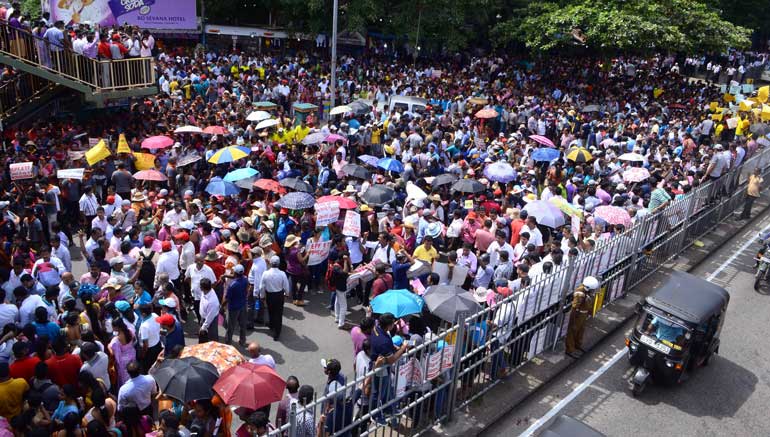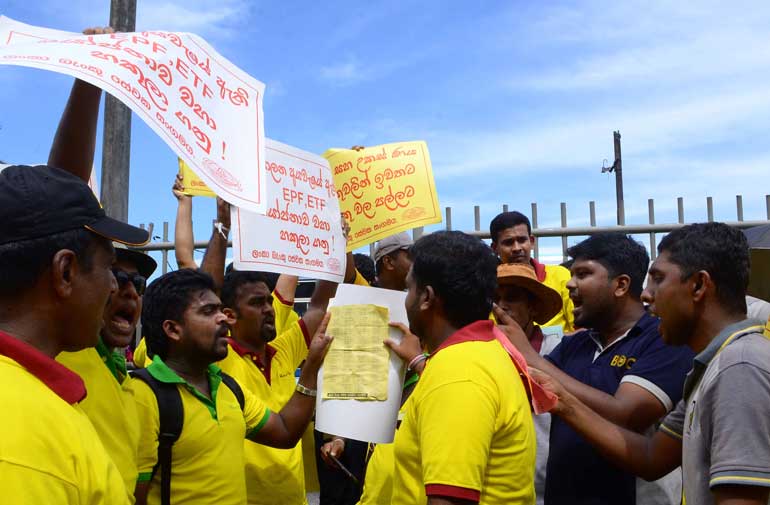Wednesday Mar 04, 2026
Wednesday Mar 04, 2026
Monday, 21 December 2015 00:00 - - {{hitsCtrl.values.hits}}


By T. Mallawa
I could not escape the temptation to make my observations on the strike called out by the Ceylon Bank Employees Union on 15 December, which was ostensibly successful, according to press reports the following day.
Joining the ranks of bank employees in 1968, I got a taste of Trade Unionism on the very first day even before joining the union when I was requested to join a protest in front of the bank I was working at and it was on account of some issue at the National & Grindlays Bank situated at York street in Fort. I did not hesitate because I felt that I had a fraternal obligation to fulfil.
After a few days, I joined the membership of the Ceylon Bank Employees Union of which I am proud of and then fell into the spell of fiery trade unionism practiced by former President W.E.V. De Mel and later the leaders of my time like Oscar Pereira, Oliwell Fernando, Sivasubramaniam, Ravi Molligoda, Ranjith Fernando who later became a Ministry Secretary and also the likes of late Valentine Merinnege, Ranjith Fernando (BOC), Karunaratne and T. Rusiripala of People’s Bank. There were other leaders too who were committed to the well being of the members. What I observed during those early years was that the trade union leaders always acted responsibly and fought for very valid causes and never allowed the CBEU to be made a tool of any political party.
During the later years of my career in the bank, I could not help but observe that some in the leadership of CBEU did not maintain that high calibre of the leaders I mentioned earlier. The CBEU was sadly allowed to be manipulated by political masters on their whims and fancies.
I will now take up the issues listed in a bulletin of the CBEU, Bank of Ceylon branch, distributed among the employees of BOC to join a strike against certain proposals in the Budget presented by the UNFGG Government. Some of the listed causes were said to be common to employees of the other banks too.
Issues
Observation – The bank employees are not members of EPF since the banks maintain their own provident and pension funds. The ETF is not coming under the Central Bank control and the ETF board functioning under the Ministry of National Policies and Economic Affairs, manages its own funds investing mostly in Government securities etc. On the other hand EPF is managed and controlled by the Central Bank. EPF even under the Central Bank Control had not been properly managed and it is learnt that its annual accounts were presented recently to Parliament two years late.
Observation – Here the Government’s intention appears to be to get the banks to focus on core banking activities rather than functions such as leasing. This deviation might help the development of the economy with bank credit being available directly for development. If the banks feel that there is a need to engage in leasing, they can certainly do so by forming subsidiary companies to handle Leasing business in competition with Finance companies. Here again the PM stated that this can be reviewed and necessary changes made if there is an adverse impact on profitability of banks.
Observation – This again is not a usual banking activity. There are a number of banks that have burnt their fingers by engaging in this trade because of varying gold prices or spurious jewellery articles being pawned. The PM has informed the unions that this too can be modified so that it will not affect the banks in an adverse manner.
Observation – Certain smaller banks and some recently established specialised banks are finding it difficult to operate in view of capital inadequacy and lack of professional skills particularly after running into high non performing advances. Any government cannot afford to allow such banks to go bankrupt because that will cause the entire financial system to collapse with untold dangers locally and internationally. So it may be with this in mind that the Central Bank has explored the possibility of mergers to ensure that the country’s financial system will not be adversely affected by any bank failure, however small they may be.
This exercise according to Government sources will be carried out after careful study and with safety precautions being in place. The Government is only exploring this option and will be open for public discussion and intervention. No decisions have been taken yet and no banks will be forced to accept mergers with banks that they do not wish to amalgamate with. For the CBEU to safeguard the rights of employees, the banking system should exist without danger of collapse.
Observation- This is not something new. The process already exists and the balances of accounts that remain dormant for more than 10 years in the banks are required to be transferred to Central bank as ‘unclaimed property’. If the funds are transferred to the Central Bank or to the consolidated fund, it does not make any difference because any legitimate holder of such accounts can later make claims by proving the bona fides to the Central Bank or the Treasury even under the proposed dispensation.
By continuing to maintain balances of inoperative or dormant accounts, the balance sheets of banks are distorted and that is not an acceptable status by any accounting standards. This rule became operational several years ago.
Observation – The ‘operative’ term is cash withdrawals from the bank counters. This is sensible in view of the operational costs to the bank, meaning cashier’s time for counting and the bank’s costs to maintain cash reserves in currency to cater to the demand and also the risks in moving cash in person by customers and other means of transport by the banks in the city streets. This proposal does not in any way restrict ‘account to account’ transfers or electronic funds transfer facilities available under SLIPS.
Usually, normal businesses or ordinary account holders withdrawing cash within the limit will not be adversely affected by the proposal. The use of cheques will be convenient and there is some legal cover for settlement by cheques.
Observation –According to my understanding, such a proposal was not included in the budget proposals but I may have missed it.
Observation – This was not in the Budget proposals but I have no idea whether there was a suggestion separately.
Observation – Here again this is not a proposal in the budget but the matter was contemplated for sometime during the past. The building is very old and repairing or revamping it may cost hundreds of millions which the bank I understand is apparently unwilling to undertake at the present moment. It is reported that the Bank of Ceylon had already withdrawn its operational offices from the building. The fate of the Hotel, under the circumstances, should be a business decision and not one based on nostalgic feelings of the employees.
Observation – This is because many retired senior citizens have invested their life’s savings in finance companies and to prevent depreciation of their savings, finance companies were given certain incentives to sustain the funds. The banks are presently recognising senior citizens by granting certain facilities including higher interest rates for deposits. The 15% interest payment by the banks is subsidised by the Government.
Observation – This is not a new proposal but it is said that there may be certain macro economic advantages. The Commercial banks can improve their services to customers engaged in Import Export trade by providing expeditious document handling systems based on IT with specialised training for staff in the related field so that they will be able to maintain and improve existing business. Shying away from competition is not an option but meeting the challenge is. Anyway, this too is a proposal yet under consideration but trade union action is not an answer.
Observation – It is not clear whether this is happening now but the management and staff should be able to convince the authorities on the prospects, negative or positive if and when forced to do so. In the current scenario, banks appear to be clamouring to open as many branches as possible.
Observation – This is pure conjecture. I recall a statement earlier by the Prime Minister that State Banks will never be privatised and they will be driven to improve performance. State banks are the pillars of the country’s economy. Contrary to claims, the IMF too had not proposed privatisation of state banks but impressed the government to streamline the operations and viability of them.
Conclusion
When these issues raised by the CBEU are carefully studied, one cannot help but come to the conclusion that they are highlighted to create fear psychosis and persuade the employees to join the strike on 15 December. This may sour the relationship of the union with the management as well as the Government. Some of the issues were clearly ones which could have been resolved by discussion and negotiation and some that were settled already. Strike action is a weapon of last resort when all else fails.
Even the veteran trade unionists like late Bala Tampoe resorted to strike action only after exhausting all avenues available to resolve issues with employers. He earned respect from not only union members but also from powerful employers. It therefore appears that the bank strike of 15 December may have been carried out with ulterior motives and one cannot rule out a possible hidden hand behind it.